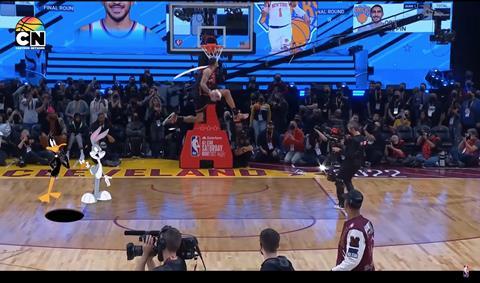Thomas ‘Hal’ Robson-Kanu discusses the benefits of content campaign partnerships between major sports events and children’s TV

Cartoon Network’s collaborations with the National Basketball Association in the US have demonstrated a growing enthusiasm within major sporting leagues to create child-friendly broadcasting.
In February, the network broadcast a half-hour, advertisement-free special featuring a comedic sports analysis by characters from the show Teen Titans. Other US sports organisations have also been announcing alternative TV formats with the aim to help attract and engage younger fans. These have included Nickelodeon’s broadcast of the National Football League game between the New Orleans Saints and the Chicago Bears in January 2021, which attracted more than two million viewers, becoming the channel’s most-watched programme in four years.

So, could creating broadcast partnerships between athletes, young people’s channels and brands be the answer to helping engage younger UK audiences to tune in and follow their teams’ progress? Perhaps, but there’s also so much more that could be done. There is a potential scope for programming with purpose – an opportunity to help educate children around sport’s proven benefits to the mental and physical wellbeing of children and young people.
The Premier League already has form when it comes to its superstars using broadcast channels to address children’s health inequalities. Manchester United’s Marcus Rashford launched his campaign to address child food poverty in 2020, highlighting the plight of vulnerable children left without a free school meal during the Covid-19 pandemic and during school summer holidays.
During his campaign, Rashford appeared in a BBC documentary and took to social media to team up with chef Tom Kerridge, who also grew up in a low-income household. Kerridge devised ‘Full Time Meals’, a set of simple, pocket-friendly recipes that require limited equipment to replicate. While videos of the chef and Rashford preparing the recipes are shared on Instagram, Facebook and YouTube, this format could also be adapted for broadcast to empower and educate children to cook their own affordable, healthy meals.

As well as fighting poverty, tackling the cycle of obesity is another area where athletes could prove to be motivating role models. Government statistics show that one third of 10 to 11-year-olds are already overweight or obese, with one report warning that children who exceed a healthy weight at that age were more likely to become adults living with obesity. Rates of obesity are also highest in the most deprived 10 per cent of the population.
We’ve seen the power of broadcast partnerships between teams, athletes and brands in the States, but these can develop even further here in the UK – or even globally – to advocate the benefits of healthier eating and encourage lifestyles which are sustainable for both people and the planet. The conventions of children’s programming could also convey that undeniable sense of energy which comes from a healthy diet and regular physical exercise.
The true impact comes from the voice of athletes. As much as rights holders and broadcasters try, ultimately it comes down to who is plastered across screens and social media that make the real difference. For example, the Lionesses’ Euro 2022 success has had an impact on girls’ sport, reaching far beyond the match broadcast. A survey released earlier this year highlighted how greater visibility of female role models was encouraging more girls to participate in sport. Could there be some powerful Women’s Super League content here?
The Lionesses were cited as trailblazers even before their historic win, along with sprinter Dina Asher-Smith. Tennis has also experienced a growth in popularity among girls, which has been attributed to rising talent Emma Raducanu.
What we can see is that brands now have this immense potential to build a deeper rapport with young consumers through a shared sense of purpose. How? Utilising broadcast partnerships that encourage children to adopt healthier lifestyles, working closely with brands and rights holders to utilise their powerful presence and voice, could take this to the next level.
Thomas ‘Hal’ Robson-Kanu is a former Premier League footballer and is now a football pundit. He’s also CEO and founder of The Turmeric Co.





No comments yet